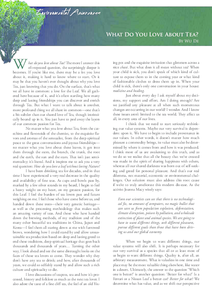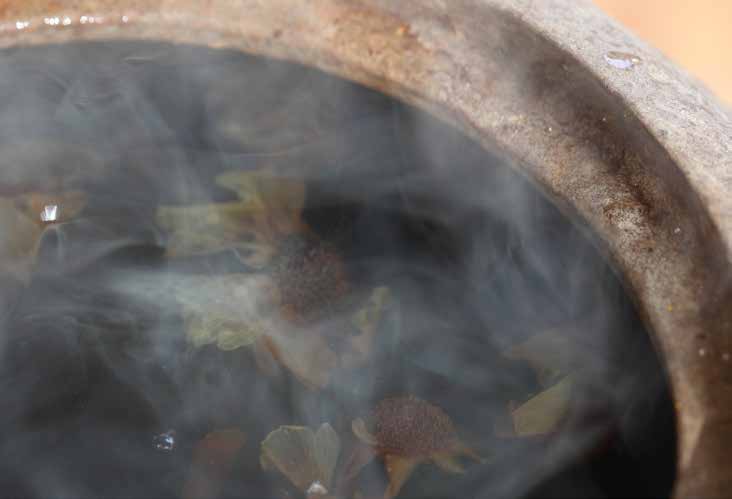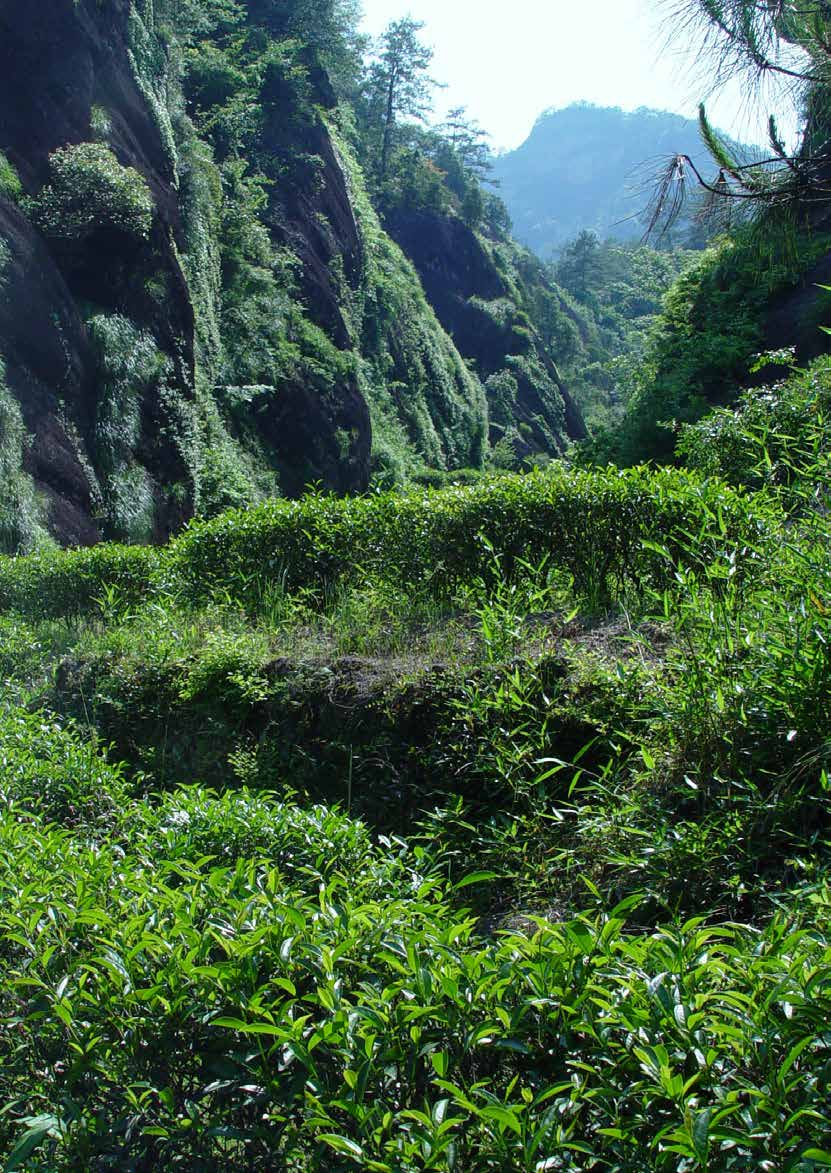
 |
|
What do you love about Tea? The more I answer this oft-repeated question, the surprisingly deeper it becomes. If you're like me, there may be a lot you love about it, making it hard to know where to start. Or it may be that you haven't ever thought about why you love Tea, just knowing that you do. On the surface, that's what we all have in common: a love for the Leaf. We all gathered here because of it, and it's often startling how many deep and lasting friendships you can discover and enrich through Tea. But what I want to talk about is another, more profound thing we all share in common - one that's a bit subtler than our shared love of Tea, though intrinsically bound up in it. You just have to peel away the layers of our common passion for Tea.
No matter what you love about Tea, from the catechins and flavonoids of the chemist, to the exquisite flavors and aromas of the sensualist, from the deep spiritual peace to the great conversations and joyous friendships - no matter what you love about these leaves, it got into them through the stem, the branch, the trunk, the root and the earth, the sun and the stars. That isn't just sentimentality; it's literal. And it inspires me to ask you a very real question: How do you love a leaf without loving Nature?
I have been drinking tea for decades, and in that time I have experienced a very real decrease in the quality and availability of fine teas. As cups and bowls pass by, marked by a few silver strands in my beard, I begin to feel a heavy weight on my heart, on my greatest passion, for this Leaf: I feel the burden of tea lovers past and future weighing on me. I feel those who have come before us, and handed down these trees - their very genetic heritage - as well as the processing methodology that makes such an amazing variety of teas. And those who have handed down the brewing methods, of my tradition and of the many other beautiful tea traditions in China, Japan and Korea - I feel them all staring down at me with furrowed brows, wondering how I could stand by and allow unsustainable tea production based on deep and lasting greed to end these traditions, deep spiritual heritage that goes back thousands and thousands of years... Turning the other way, I look ahead and see the same distraught looks on the faces of those tea lovers to come. They wonder why they don't have any tea to drink; and how, after thousands of years, we could so selfishly stand by and allow such a rich culture and spirituality to die.
I love discussions of teapots, tea and how it's processed, history and folklore as much as the next tea lover. I also adore the taste of a fine cliff tea, the feel of an old Yixing pot and the exquisite invitation that glimmers across a nice chaxi. But what does it all mean without tea? When your child is sick, you don't speak of which kind of culture to expose them to in the coming year or what kind of fashionable clothes to dress them up in. When your child is sick, there's only one conversation in your house: medicine and healing.
Just about every day I ask myself about my decisions, my support and effort. Am I doing enough? Are we justified any pleasure at all when such momentous changes are occurring in our world? I wonder. And I know these issues aren't limited to the tea world. They affect us all, in every area of our lives.
I think that we need to start seriously rethinking our value systems. Maybe our very survival is dependent upon it. We have to begin to include provenance in our values. In other words, it doesn't matter how much pleasure a commodity brings, its value must also be determined by where it comes from and how it was produced.
I think more of us are awakening to this truth, and as we do so we realize that all the beauty that we've created was made in the spirit of sharing happiness with others, whereas all our shared darkness was born out of self-seeking and greed for personal pleasure. And that's our real dilemma, not material, economic or environmental challenges. Our solution must also address this root cause if we're to truly ameliorate this modern dis-ease. As the activist Joanna Macy wisely says:
Even our scientists can see that there is no technological fix, no amount of computers, no magic bullet that can save us from population explosion, deforestation, climate disruption, poison by pollution, and wholesale extinction of plant and animal species. We are going to have to want different things, seek different pleasures, pursue different goals than those that have been driving us and our global economy.
When we begin to want different things, our value systems will also shift. It is perhaps necessary for our very survival as a species that all or at least most of us begin to want different things. Quality is, after all, an arbitrary measurement. What is valueless in one time and place may be the most valuable thing elsewhere, like water in a desert. Ultimately, the answer to the question 'Which one is better?' is another question: 'Better for what?' Is a Ferrari or a Nissan Leaf a better car? Better for what? We determine what has value, and as we shift our perspective towards a global awakening, wanting new things, our values will also shift. This isn't impossible. It has happened before. We can want different things, like a world where quality and value are determined by a product being produced in harmony with Nature.

As we awaken, the interconnectedness of all things becomes more than just an intellectual ideal; it's a very real truth. Every tea we enjoy represents the backbreaking labor of another person - their sweaty bandana around their wrist as they toil in the hot sun. Our tea also represents thousands of years of genetic and cultural heritage, not to mention the connection it has to Great Nature through the earth and sun, rain and wind. Loving Tea is loving Nature. And that's true for anything and anyone we love. Our bodies are seventy-five percent water, so if you tell me you love your children or your spouse, your mother or your father, you also love the water. And there is no more landfill "over there" where we can dump our garbage and pollution - our bodies are now the landfills as well. Since our bodies are literally made of water, the pollution and sickness in the world's water is our sickness as well. And worse yet, it will be the sickness of all the unborn children yet to come.
There is another truth, which is that the Earth doesn't have any pollution problems or climactic problems. This planet has only one problem: people! If there weren't any human beings in Taipei, it would be green and full of birds and deer in just decades. And just as the earth's problems are in humanity and not the environment, our problems cannot be distilled in political or economic reform. Humanity isn't blighted by politics. Our disease is a heart disease. You heal the heart, and you heal a person; you heal a person, and the world is that much more healed. And as spiritual practitioners, we have to begin to be aware of all the invisible costs that come with all our choices. Every time we drive, we contribute to global warming; every tea we drink comes at a price. This is a globe, and an interconnected one, so it is not acceptable to pride oneself in a movement towards environmental cleanliness in the United States when that cleanliness has come at the expense of moving all the polluting factories to China.
Our bodies work in harmony with the environ ment. We breathe in the air, drink the water and our energy is the energy of the plant kingdom. The trees are as essential for our survival as any of the organs in our body, and just as the organs in our body survive through cooperation, we must also cooperate with the natural world. It is no longer okay for me to sit in beautiful surrounds and drink tea casually without being conscious of my body's connection to the body of the world. The tea I drink must be produced in a way that is sustainable for future tea lovers, is healthy for me and the Earth, for I know that I cannot have one without the other. If I am to be healthy, the tea I drink must also be healthy. And though it seems beautiful and peaceful here in my tea room, it actually isn't peaceful at all if the very purpose of the room, the tea, was produced in a way that is violent to the Earth. All the decorations and accouterments in this room are but weapons of greed and destruction if my tea is harmful to myself, my guests and our Mother Earth.
Though such a perspective seems strong, it isn't motivated by guilt or finger-wagging preaching. I am motivated by love - a deep love for Tea! And I think that real change comes through love rather than guilt, anyway. Sometimes I have to exhale and accept things as they are, sitting back in peace with my organic tea and sighing with contentment. Sometimes that is the best thing I can do for everyone - enjoy my tea and smile at the next person I see. Thomas Merton, the Trappist monk, quite poignantly said:
To allow oneself to be carried away by a multitude of conflicting concerns, to surrender to too many demands, to commit to too many projects, to want to help everyone in everything is itself to succumb to the violence of our times.
If we don't keep our heads up, and our hearts positive, we become a part of the problem. If we get angry with our brothers, we just fill the world with more hate, when our very real heart problems are only going to be healed with love (and a little tea). Maybe it's alright just as it is, my Tea seems to say - each sip deepening a sense of completion... Still, we have to stand up for what's important. As the Hopi say, "We are the ones we've been waiting for!" It is up to us to commit to organic, sustainable tea production. As time goes on, and the quality and availability of fine tea goes down, I find that this point becomes more important than anything else. And tea has taught me to look for the costs of any of my enjoyments in life, recognizing that pleasure which comes at the cost of future pain for myself or others is not really going to bring me any lasting happiness or joy.

Sometimes it helps me to practice getting out of a human-centric perspective - to see things from Nature's eyes. So much of our world's problems come from the self-serving mind. We have to learn to rise above the selfish conditioning of our times. Rather than viewing Tea as a substance or a commodity that brings me joy, I like to see Her as, well... a "Her"! In doing so, I ask myself about what She wants. If you love someone, you want to serve her. And when we awaken to our interconnectedness with everything in this world, we wish to serve it as naturally as we serve ourselves, knowing that its pain is our pain, and its triumph ours as well. However, if you want to serve someone, you have to know what she really needs. And so I often find myself asking the questions I now ask you: What does Tea want? What does your love for Tea compel you to do for Her? I think that just asking these questions is already the beginning of a transformation in the way you see your place in the natural world, and the way you relate to Tea and others.
No one travels to our center to see Wu De. They come from around the world because of the tea and rich tea tradition here at this center. And Tea is my master, as all of my wisdom comes through Her, and other Chajin who passed their wisdom on to me. So even if you had respect for a wisdom I shared with you, I would just pass on your bows to Her anyway. She's taught me that we are connected to Nature and to each other. She's taught me the joy in serving others. She has taught me to live simply, asking myself about the hidden costs in my actions, knowing they are influential to my world. And She's taught me that living simply also makes me happier, for I find much more satisfaction and joy in helping others, alleviating suffering and awakening people to their own connection to the heart of Nature than I ever could in any self-seeking pleasure. One of my personal heroes, Emerson, whose legacy, when measured in his own terms, finds its conclusion in great success, put it this way:
To appreciate beauty and find the best in others; to leave the world a bit better, whether by a healthy child, a garden patch, a redeemed social condition, to know even one life has breathed easier because you have lived, this is to have succeeded.
As the kettle dries and we bow, the tea drunk and this beautiful discussion ending, we might smile at the many bowls of organic, sustainable tea we've shared together. As we leave, we should do so a bit lighter, knowing that we share something deeper in common than our love for Tea. We both love Nature. Just as we can't love tea without loving the Nature that made it, neither can we love ourselves, our lives on this Earth or each other without loving that same Nature that made us. And maybe if we start to have more talks about simplicity and connection with regards to tea, we can all move towards a global tea production that will make past and future tea lovers proud of us.
